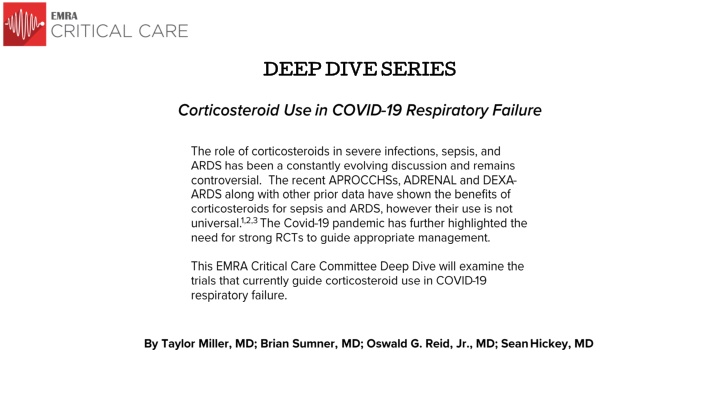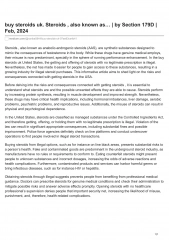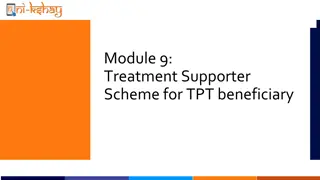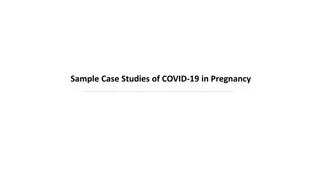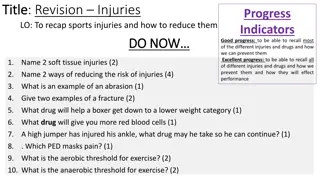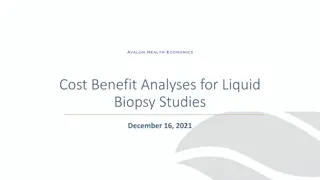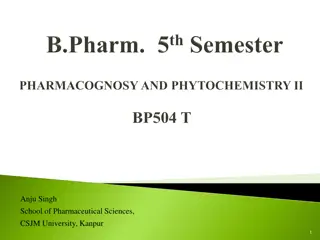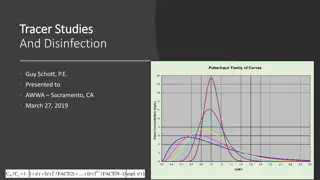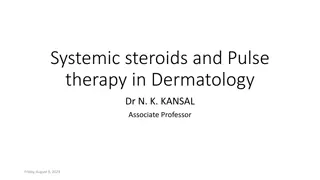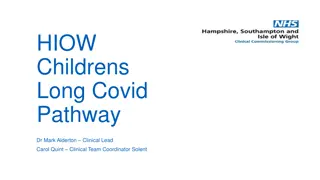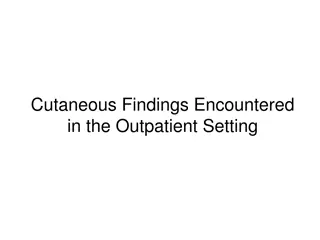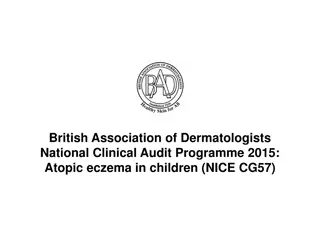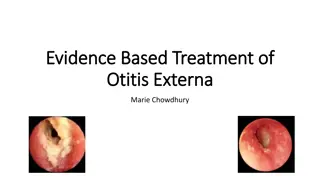Effectiveness of Steroids in COVID-19 Treatment: Insights from Recent Studies
Recent studies delve into the impact of different steroids on mortality and organ support in hospitalized COVID-19 patients. The use of dexamethasone showed a significant reduction in 28-day mortality, especially in patients requiring oxygen support. On the other hand, the REMAP-CAP trial assessed the effects of hydrocortisone on organ support in severe COVID-19 cases and found a high probability of superiority compared to no steroid therapy. The CAPE COVID Trial investigated the impact of hydrocortisone on treatment failure in critically ill patients with COVID-19. These studies shed light on the potential benefits of steroid use in managing severe cases of COVID-19.
Download Presentation

Please find below an Image/Link to download the presentation.
The content on the website is provided AS IS for your information and personal use only. It may not be sold, licensed, or shared on other websites without obtaining consent from the author.If you encounter any issues during the download, it is possible that the publisher has removed the file from their server.
You are allowed to download the files provided on this website for personal or commercial use, subject to the condition that they are used lawfully. All files are the property of their respective owners.
The content on the website is provided AS IS for your information and personal use only. It may not be sold, licensed, or shared on other websites without obtaining consent from the author.
E N D
Presentation Transcript
DEEP DIVE SERIES DEEP DIVE SERIES
Effect of Dexamethasone in Hospitalized Patients with COVID-19 - Preliminary Report The RECOVERY Collaborative Group DEEP DIVE SERIES DEEP DIVE SERIES Steroids in COVID-19 Primary Outcome: 28-day all-cause mortality Objective To determine the effect of dexamethasone on 28-day mortality in hospitalized patients with COVID-19. Patients who received dexamethasone had significantly lower 28-day mortality (21.6% vs 24.6%, RR 0.83, 95% CI: 0.74-0.92). Figure: Relative mortality risk by oxygen requirement: Intervention Dexamethasone 6 mg daily for 10 days Compared to usual care Methods Open-label Randomized, controlled trial 176 NHS hospitals in the United Kingdom The Bottom Line This was the first study to identify that steroids decrease mortality in COVID-19 patients. The mortality reduction is large, with a number needed to treat to prevent one death of 8 patients receiving mechanical ventilation and 25 patients requiring oxygen. There was, however, a nonsignificant signal of harm in patients who didn t require oxygen support, which suggests it should not be used indiscriminately.
Effect of Hydrocortisone on Mortality and Organ Support in Patients With Severe COVID-19. The REMAP-CAP COVID-19 Corticosteroid Domain Randomized Clinical Trial DEEP DIVE SERIES DEEP DIVE SERIES Steroids in COVID-19 The Writing Committee for the REMAP-CAP Investigators Objective Study investigators aimed to determine whether hydrocortisone improved outcomes for patients with severe COVID-19. Intervention Randomized to one of three dosing regimens within the domain of hydrocortisone therapy. 1. 7-day course of intravenous hydrocortisone (50 mg or 100 mg every 6 hours) 2. Shock-dependent course (50 mg every 6 hours when shock was clinically evident) 3. No hydrocortisone Methods Multicenter, Randomized, embedded, multifactorial, adaptive, platform trial Statistical analysis with Bayesian statistics Primary Outcome: Days alive and free of ICU-based cardiopulmonary support within 21 days of randomization Median organ support free days were 0 (IQR, 1 to 15), 0 (IQR, 1 to 13), and 0 (IQR, 1 to 11) Value of (-1) was used as the outcome for death Median adjusted odds ratios of 1.43 (95% CrI, 0.91-2.27) and 1.22 (95% CrI, 0.76-1.94) for the fixed-dose and shock-dependent groups Associated with a 93% and 80% probability of superiority when compared to no hydrocortisone therapy Selected secondary outcome: Median adjusted odds ratios of 1.03 (95% CrI, 0.53-1.95) and 1.10 (95% CrI, 0.58-2.11) for the fixed-dose and shock-dependent groups, respectively associated with a 54% and 62% probability of superiority when compared to no hydrocortisone administration The Bottom Line Study authors demonstrated the high probability of superiority of corticosteroid use compared to no steroids with respect to organ support free days within the first 21 days of treatment in patients suffering from COVID-19 and requiring cardiopulmonary support in an ICU. Of note, this study was stopped early and didn t make their prespecified targets for significance.
Effect of Hydrocortisone on 21-Day Mortality or Respiratory Support Among Critically Ill Patients with COVID-19 The CAPE COVID Trial Group Investigators DEEP DIVE SERIES DEEP DIVE SERIES Steroids in COVID-19 Objective Study investigators aimed to determine whether hydrocortisone impacts treatment failure on day 21 in critically ill patients with severe acute respiratory syndrome coronavirus 2 (SARS-CoV-2) infection and acute respiratory failure (ARF). Primary Outcome: Treatment failure on day 21 (Death or persistent dependence of mechanical ventilation or high-flow oxygen therapy) Hydrocortisone (n=76) 32 42.1% Intervention Patients were randomized to one of two dosing regimens: 1. 14-day course of hydrocortisone 200 mg/d until day 7, 100 mg/d for 4 days, and 50 mg/d for 3 days. 2. Placebo: Saline Placebo (n=73) 37 50.7% Secondary Outcome: Hydrocortisone group vs. Placebo group Need for endotracheal intubation (for patients non invasively ventilated at inclusion): 8/16 (50.0%) v. 12/16 (75.0%) Cumulative incidences of prone position sessions: 36 (47.4%) vs. 39 (57.4%) Need for extracorporeal membrane oxygenation: 2 (2.7%) vs/ 2 (2.7%) Need for Inhaled nitric oxide: 5 (6.7%) vs. 11 (15.0%) Occurrence of nosocomial infections on day 28: 28 (37.7%) vs. 30 (41.1%) Methods Multicenter, randomized, double-blind, sequential trial with interim analyses planned for every 50 patients. Embedded in the ongoing Community Acquired Pneumonia: Evaluation of Corticosteroids (CAPE COD) trial. For the primary analysis, missing data was considered treatment failure. No imputation was made for secondary outcomes. The statistical tests performed for this study were 2-sided. The Bottom Line The use of low-dose hydrocortisone in critically ill patients with COVID-19 and ARF did not significantly reduce the prevalence of treatment failure at day 21. It is important to note that this clinical trial was stopped early, which may have impacted its ability to provide a statistical difference in the primary outcome.
Effect of Dexamethasone on Days Alive and Ventilator-Free in Patients with Moderate or Severe Acute Respiratory Distress Syndrome and COVID-19: the CoDEX Randomized Clinical Trial The COALITION COVID-19 Brazil III Investigators DEEP DIVE SERIES DEEP DIVE SERIES Steroids in COVID-19 Primary Outcome: Ventilator free days in the first 28 days, defined as days alive and free of mechanical ventilation for at least 48 hours Objective To identify the effect of dexamethasone on ventilator free days in patients with COVID-19 associated ARDS Days alive and free of a ventilator in 28 days was 6.6 days in the dexamethasone group and 4.0 days in the control group, for an adjusted difference of 2.26 days (95% CI: 0.2-4.38, P= 0.04). There was no difference in secondary outcomes or adverse events Intervention Dexamethasone 20 mg IV once daily for 5 days, then 10 mg IV for 5 days or until ICU discharge Compared to standard care Figure: Ventilator- free days at 28 days Methods Open-label Randomized, controlled trial 41 ICUs in Brazil The Bottom Line The administration of steroids increased ventilator-free days for this particularly sick cohort of COVID-related ARDS patients.
Association Between Administration of Systemic Corticosteroids and Mortality Among Critically Ill Patients With COVID-19: A Meta-Analysis The WHO Rapid Evidence Appraisal for COVID-19 Therapies (REACT) Working Group DEEP DIVE SERIES DEEP DIVE SERIES Steroids in COVID-19 Objective Study investigators aimed to determine if the administration of systemic corticosteroids was associated with reduced 28-day mortality in critically ill patients with coronavirus disease 2019 (COVID-19). Primary Outcome: All-cause mortality up to 30 days after randomization (shorter terms accepted if 30 days not available) Number of deaths in patients receiving corticosteroids 222/678 Number of deaths in patients receiving usual care or placebo 435/1025 Methods Meta-analysis of 7 clinical trials which examined the clinical effects and outcomes of corticosteroids administration in patients with COVID-19 DEXA-COVID CoDEX RECOVERY CAPE COVID Summary OR for death in patients receiving dexamethasone 0.64 (95% CI, 0.50-0.82; P < .001) COVID STEROID REMAP-CAP Steroids-SARI Summary OR for death in patients receiving hydrocortisone 0.69 (95% CI, 0.43-1.12; P = .13) OR for death in patients receiving methylprednisolone 0.91 (95% CI, 0.29-2.87; P = .87) Inclusion Criteria Listed with clinicaltrials.gov, Chinese Clinical Trial Registry or EU Clinical Trials Registrar Listed between December 31, 2019 and Apri 6, 2020 Trials must have examined interaction of corticosteroids and COVID-19 Exclusion Criteria: Wrong intervention Not currently enrolling Ineligible Population The Bottom Line Use of corticosteroids in critically ill patients, including those with COVID-19 was shown to be associated with lower 28-day all-cause mortality. The lack of synthesis of this data into recommendations of dosage and duration of treatment makes these findings less user-friendly, but point towards overall mortality benefits.
